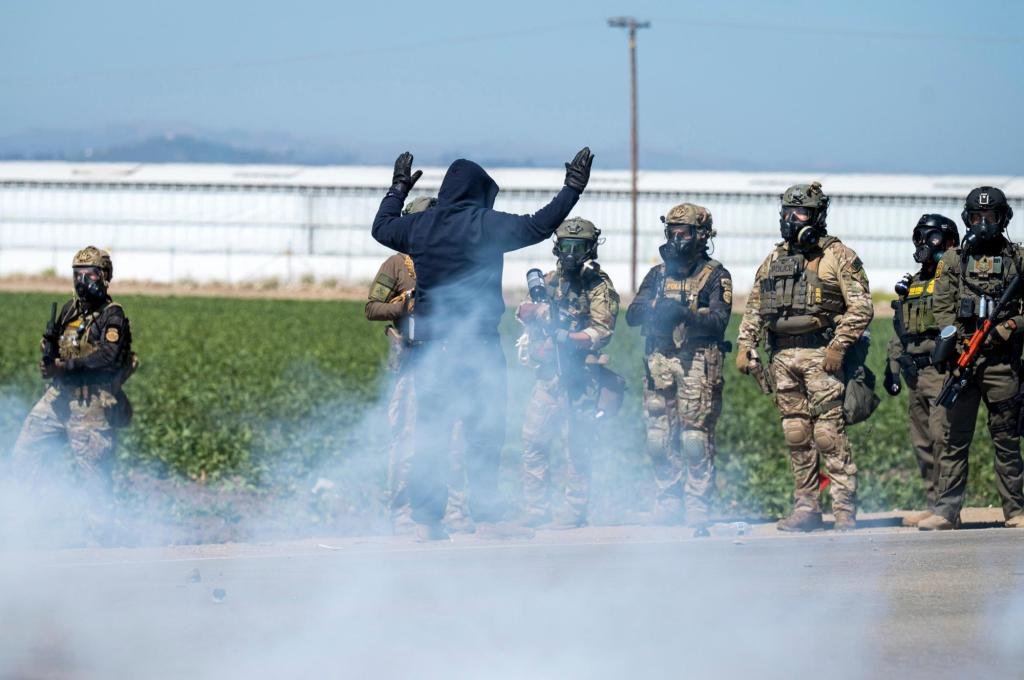Title: Tensions Rise as Federal Immigration Raids Target California Cannabis Farms
Introduction
Recent federal immigration raids in California have ignited significant controversy and unrest. On July 10, 2025, immigration authorities arrested roughly 200 individuals alleged to be living in the country illegally during operations at two cannabis farms in Carpinteria and Camarillo. This concerted enforcement action has raised alarms among immigrant communities, drawing intense protests that clashed with federal agents. The ramifications of these events continue to unfold, showcasing the broader implications on immigration policy and community stability.
Background of the Raids
The U.S. Department of Homeland Security stated that the raids were conducted with criminal search warrants targeting specific cannabis farms, which are increasingly becoming focal points for law enforcement operations against undocumented workers. Authorities assert that among those arrested were not only suspected undocumented immigrants but also US citizens accused of obstructing the operation. In disturbing reports, at least one worker suffered serious injuries during the raid, illustrating the potential dangers associated with such enforcement actions.
Protests and Community Response
As immigration agents descended upon the Glass House Farms in Camarillo, a substantial number of protesters gathered to voice their concerns about immediate family members caught in the crackdown. Videos and eyewitness accounts reveal heightened tensions, including the use of tear gas and rubber bullets by federal agents to disperse crowds. Eyewitnesses describe chaotic scenes where families tried to reach loved ones, underscoring the emotional toll these operations take on communities already beset by fears related to immigration enforcement.
Personal Stories from the Ground
Among those affected is Jaime Alanis, who unintentionally became a central figure during the raid. Alanis, a tomato picker with a decade of service, managed to contact his wife in Mexico, informing her about the unfolding events before ending up in the hospital with severe injuries. His story highlights the personal cost of these federal actions and sheds light on how such enforcement can have tragic consequences. Similarly, family members of other workers have echoed sentiments of fear and desperation as they navigate the aftermath of the raids.
Federal Agents and Community Strain
The ongoing tension has strained relationships between law enforcement and local communities, particularly in regions heavily reliant on immigrant labor. With claims that the raids disrupt not only the lives of the undocumented workers but also those of their families and the agricultural sector, a serious discussion about the implications for local economies is warranted. The community’s plea for transparency and clearer communication from both the federal authorities and farm employers like Glass House has become increasingly urgent.
Conclusion: The Broader Implications
As the dust settles from these raids, the implications for immigration policy in the U.S. continue to be a topic of debate. Public sentiment seems increasingly divided, with some supporting strict enforcement while others advocate for more humane policies. The events at the California farms serve as a microcosm of the ongoing struggles surrounding immigration reform and labor rights, highlighting the necessity for ongoing dialogue and legislative action to find effective solutions that address both security and humanitarian concerns. The stories emerging from Camarillo encapsulate the complex intersections of immigration, labor, and community safety, serving as a call to navigate these turbulent waters with empathy and diligence.









